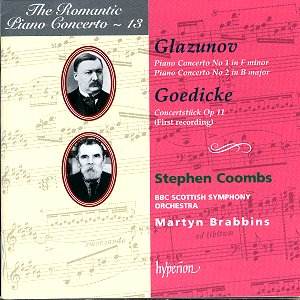Stephen Coombs has made Glazunov's piano music a central
part of his repertoire. His recorded performances of the complete works
for solo piano drew high praise. So too are these performances of the
two concertos notable achievements.
Glazunov came to the concerto relatively late.
A prolific composer from his teenage years, he had already written the
symphonies which dominate his creative output, as well as the magnificent
ballet scores Raymonda and The Seasons, before he turned
to these piano concertos. The Violin Concerto dates from the mid-1900s,
so the same point applies to that piece too, if not quite so strongly.
These ideas are not without importance, since three
of Rachmaninov's piano concertos had been written by the time of Glazunov's
Concerto No. 1. Despite the boldly original form, the music remains
in the shadow of Rachmaninov's style, though, to be fair, Glazunov does
idiomatically share the richly romantic outlook of the post-Tchaikovsky
generation of Russian composers (he was eight years older than Rachmaninov).
His orchestral writing is as opulent and imaginative as we would expect,
and the piano part balances imaginatively with it. Anyone who enjoys
this kind of musical indulgence - and most of us do - will enjoy Glazunov's
concertos.
The first movement has a splendid sweep, with a gloriously
lyrical second theme which receives the full treatment. All praise,
therefore, to the Hyperion recording for conveying this so indulgently.
The second and final movement is an extended theme and variations, using
titles such as 'eroica', 'quasi una fantasia' and 'mazurka'. It is as
if Glazunov was prompting himself to compose the music from a preconceived
plan. But the concerto does sound a good deal more spontaneous than
this, and both Coombs and Brabbins respond to its shadings, the ebb
and flow of tension and relaxation.
There is a tendency in the First Concerto to emphasise
the romantic expression and the lyrical flow, perhaps at the expense
of displaying the technical display which must remain a priority in
a romantic piano concerto. These thoughts are paramount also in the
Second Concerto, whose highlight is a central Andante of thoughtful
construction and deeply felt emotion; it is therefore very Russian.
The opulent recorded sound emphasises these characteristics, and may
be responsible to some extent for the (relative) failure of the more
lively outer movements to provide the kind of excitement which the indulgence
of romantic virtuosity might demand. One wonders whether a little more
drive and power might have brought dividends.
There are no such worries in the shorter concluding
item, the Conzertstück by Alexander Goedicke. Despite living
on to 1957, he composed this piece as early as 1900, a decade before
Glazunov wrote his piano concertos. Goedicke, born in Moscow in 1877,
was the cousin of Nikolai Medtner, in whose shadow posterity has left
him. But he was a musical talent in his own right, who from 1909 served
as professor of piano at the Moscow Conservatoire.
According to Francis Pott's thorough and well written
insert notes, Goedicke's creative efforts were most successful in the
earlier part of his career, and the Conzertstück is therefore a
typical example. It is a somewhat diffuse piece, whose structure relies
considerably on the motto theme with which it opens. The piano writing
tends to be complex and decorative, and Stephen Coombs responds to
it enthusiastically and directly, playing with much brilliance. Although
this is in no sense a major work, it is most engaging, and its addition
to the catalogue in this, its only recording, is therefore welcome.
Terry Barfoot


